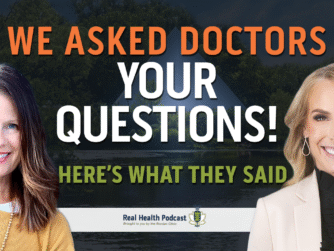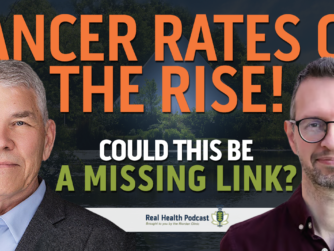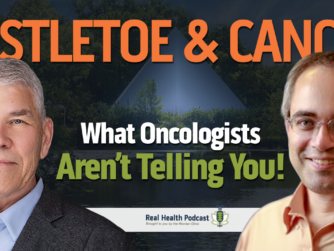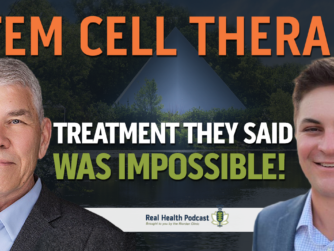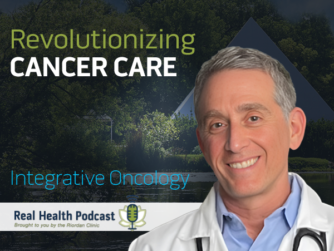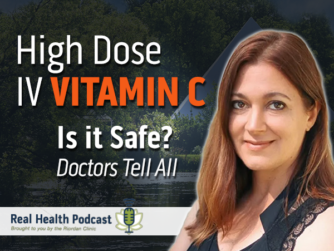Dr. Lucas Tims, ND, FABNO, and Dr. Kirsten West, ND, LAc, FABNO, discuss ways that lifestyle and environment contribute to cancer more than genetics. Modifiable lifestyle factors include stress, immune function, dietary intake, toxic burden, and inflammation which can lead to a diagnosis of cancer. Comprehensive testing can help guide patients and providers to personalized treatment plans.
Thank You To This Episode’s Sponsor
Bio-Center Laboratory
Episode Transcript
Episode #41: Underlying Causes of Cancer
Disclaimer: The information contained on the Real Health Podcast and the resources mentioned are for educational purposes only. They are not intended as, and shall not be understood or construed as medical or health advice. The information contained on this podcast is not a substitute for medical or health advice from a professional who is aware of the facts and circumstances of your individual situation. Information provided by hosts and guests on the Real Health Podcast or the use of any products or services mentioned does not create a practitioner patient relationship between you and any persons affiliated with this podcast.
Intro: This is the Real Health Podcast brought to you by Riordan Clinic. Our mission is to bring you the latest information and top experts in functional and integrative medicine to help you make informed decisions on your path to real health.
Dr. Lucas Tims: All right. Welcome everyone to another episode of the Real Health Podcast. I’m Dr. Lucas Tims, and I’m joined today by the newest addition to the Riordan Clinic team, Dr. Kirsten West. Dr. West, thanks for being with us today.
Dr. Kirsten West: Great to be here.
Dr. Lucas Tims: Dr. West is, like I said, a new addition to our team. Comes with a great track record of working in the integrative oncology space. Has seen a lot of stuff in her career so far and just brings a wealth of knowledge and is really a nice addition. So we’re excited to have her.
Dr. Lucas Tims: Today we’re going to be talking a little bit, Dr. West, about cancer, of course, but more so specifically underlying causes of cancer, which I think this is where there seems to be a lot of lacking discussion, I think, on the more conventional side. I think it’s an area where integrative oncology actually is taking more of a lead in terms of dealing with what people may term as root causes of cancer.
Dr. Lucas Tims: So the way I explain it to my patients is that cancer’s never just bad luck, despite what they may be told by their traditional oncologist or anybody else that they’ve talked to so far, and that there’s always sort of factors and layers of things that build up sometimes over years that ultimately create this crescendo process, which is a tumor or a cancer. Is that kind of how you see it?
Dr. Kirsten West: Yeah. I absolutely see it like that and doing this for, gosh, both you and I have been doing this for over a decade now, which is crazy to think about, but I think that cancer really comes down to genes that are mismatched with our current lifestyle and environment. I think some of the biggest things that I see in practice and I’d love to hear your thoughts on these too, but I think stress is a big one and we know that stress impacts the immune system. I think metabolic imbalance. You can really start to think about the Terrain 10, but I think that we can pull … For people who aren’t familiar with the Terrain 10, it’s Dr. Winters’ work, and I know you and Dr. Ron have done several podcasts on that, but we can pull from those and kind of see some main patterns that we see more clinically or maybe that are a little bit more relevant.
Dr. Lucas Tims: Yeah. I think the Terrain 10 is a great all-encompassing way of teasing out all these different factors, but I think what you said was really poignant, which was that we have these mismatched genes with the lives that we’re trying to live. I’ve heard some other people say different versions of that, but it really does ring true because I think a lot of people get drawn into that mindset of cancer being a genetic problem purely.
Dr. Kirsten West: Right.
Dr. Lucas Tims: But it doesn’t really just start and end with the genes, essentially.
Dr. Kirsten West: Right. I feel like if we speak to it like that, it’s just luck of the draw.
Dr. Lucas Tims: Right.
Dr. Kirsten West: There’s empowerment to actually be responsible and take charge of our health and make changes and I think that that’s what you and I see in practice is that when people really do start to see what areas they need to be focused on that could have led to having cancer, that’s when we see healing.
Dr. Lucas Tims: Yep. Yeah. So if we take that, I don’t know, sometimes I almost see it in my head as like a pyramid where it’s like that top portion of the pyramid is the cancer and maybe right underneath that is a layer of this genetic dysfunction but then there’s several more layers beneath that are holding those issues up. Those are the layers we’re talking about.
Dr. Kirsten West: Right. This was so poignant, I heard someone say this, but there’s several people walking around with BRCA mutations that will never know that they have BRCA mutations because they never have cancer and so it’s just that’s an example of a gene that hasn’t been turned on based on specific modifiable lifestyle factors.
Dr. Lucas Tims: You’re talking about the breast cancer gene, most people know is the BRCA gene, or BRCA one or two. What most people don’t understand is that actually this gene, we want it turned on. It actually prevents that cascade of the cancer process. It’s when it’s mutated and turned off is when we have that increased risk. That’s a great segue into, talk a little bit about how do these genes actually get turned on and off?
Dr. Kirsten West: Yeah. I kind of think of it as we have our blueprint of our genes that have been given to us by our parents. But then we have the contractors and the contractors are the ones that actually put the blueprint into motion, or don’t put the blueprint into motion. The contractors are those modifiable lifestyle factors, such as stress, immune function, dietary intake, toxic burden, inflammation, all of these things that can lead to a diagnosis of cancer or cause turning on or off of these genes that could lead to a carcinogenic process.
Dr. Lucas Tims: Right. This is not a black and white process either. It’s an always evolving dynamic process that’s going on in our bodies every second of every day.
Dr. Kirsten West: Which is why our treatments are never just black and white, which is why we never just focus on one thing or another thing. It’s really about finding those things that come together to create the greatest harmony in the body so that the body gets back in the driver’s seat from a disease or cancer in process or things like that. So, exactly.
Dr. Lucas Tims: Right. So it’s helpful to know about the cancer and what type it is and if there’s driver mutations and what genes are involved, because then that can help you to maybe reverse engineer the underlying issues as well. We’re not discounting all that information they use on the traditional site isn’t helpful. It’s just that there’s more that we can do to actually influence that top of the pyramid by modifying the environment.
Dr. Kirsten West: Exactly. Because there’s some genes that are turned on within specific tumors that may relate to a little bit more blood sugar dysregulation and so if we see that, then we know that, gosh, maybe for years there’s been some metabolic imbalance going on and that’s a big area that we need to focus on.
Dr. Lucas Tims: Yeah.
Dr. Kirsten West: Sorry, Dr. Tims. Also, that study with ovarian cancer where they found out that several ovarian cancer cells had beta adrenergic receptors on them, which are stimulated by stress.
Dr. Lucas Tims: By stress. Right.
Dr. Kirsten West: That also plays into it.
Dr. Lucas Tims: You’ve mentioned diet, you’ve mentioned stress, you’ve mentioned environmental toxins. That’s another big one that I see in a lot of my patients. Do you typically test all of your patients for environmental toxins or just if you get kind of some clues in their history?
Dr. Kirsten West: I do. I do. Obviously history really helps, to ask them where they grew up, where they’re living, et cetera, and figure out. But I do think that if we have the ability to run a toxic panel profile or test on all of our patients, I think that that is something that we should do. The more information the better.
Dr. Lucas Tims: Yeah and another area that gets impacted by all these environmental issues and the epigenetics that we’re talking about is not just the genes of our cells, but the mitochondria, right?
Dr. Kirsten West: Yep.
Lucas Tims: Yeah. These mitochondria, which some people are familiar with, some people aren’t, but these are little organelles inside of our cells that come from bacteria actually and that you actually get handed down to you by your mom. These are actually, they’ve sometimes been described as the energy packs of the cell or the batteries of the cell and a lot of the hallmarks of what drives a cancer cell is found with problems in the mitochondria. Correct?
Dr. Kirsten West: Right. We’ve actually come to an understanding that cancer may be more of a disease of mitochondria and so that’s an area that we really want to focus on.
Dr. Lucas Tims: Right.
Dr. Kirsten West: That also takes us into fasting because we know that fasting is one of the best ways to also help rejuvenate mitochondrial health.
Dr. Lucas Tims: Right. Fasting. Now shifting more towards interventions or therapies that we might employ to address some of these, obviously you can change your diet and that’s a big part of it in terms of correcting metabolic issues or avoiding certain toxins that may be coming in through your food or water. As far as ways that we can impact the mitochondria, you talked about fasting but, some of our IV therapies like IV vitamin C and ozone therapy are also mitochondrial therapies.
Dr. Kirsten West: Absolutely. Absolutely and then there’s some great supplements that are good to support mitochondria as well so that’s an area we can really focus on.
Dr. Lucas Tims: Yeah and it’s important to understand that everybody’s pyramid or the blueprint is going to be different. So it’s not like, “Oh, I saw so-and-so changed to this type of diet and took these supplements and did this IV therapy. That’s what I’m going to do.” It’s not really that simple, right?
Dr. Kirsten West: It’s not and that’s the beauty of what we do because it’s so individualized and it’s so prioritized for each patient.
Dr. Lucas Tims: Yeah.
Dr. Kirsten West: So while metabolic patterns may be a huge issue for one person, immune may be a bigger picture for someone, toxic burden may be a larger issue for someone else. So figuring that out and building the pyramid appropriately, or at least elucidating the pyramid appropriately is the way to go.
Advertisement: There’s a lot more to this conversation and it’s coming up right after a quick break. Today’s podcast is brought to you by Bio-Center Laboratories. The Bio-Center Laboratory provides state-of-the-art lab testing and diagnostic services for healthcare providers, laboratories, hospitals, and the general public. Lab tests available through Bio-Center include a comprehensive list of vitamins, minerals, fatty acids, amino acids, hormones, and pyrroles. We also provide a variety of standardized tests for disease markers. These markers include cardiovascular disease, diabetes, thyroid dysfunction, hormone imbalance, and more. Visit biocenterlab.org to learn more.
Dr. Lucas Tims: That’s why I think we’re so big on doing really comprehensive testing with each patient because we never quite know what each person’s blueprint’s going to look like. You can’t really guess correctly all the time on what those issues are even with a proper history and figuring out as much as you can about the patient. You still, those labs can really help you to get that blueprint.
Dr. Kirsten West: Right, and as you spoke about earlier, also the genes. The genes that we might find in specific cancers that they may get through medical oncologist or additional tests. We can put all of that together. So it really is integrative care. It’s putting it all together.
Dr. Lucas Tims: It’s integrative care and it’s not just something that patients can do while they’re going through the cancer treatment process but even beyond that. Again, it’s not like you get to this finish line where, okay, the cancer’s gone and you don’t have to do anything else.
Dr. Kirsten West: No, and that’s actually the hardest time because if patients are in standard of care treatments and they get finished, that’s kind of the time where it’s like, “Well, what do I do now to make sure that this doesn’t come back?” And that’s where what we do really helps. For me, I want my patients to feel so empowered. I know you do, too. I want them to feel better than they ever felt prior to getting cancer because there’s obviously some reasons or some imbalances that it started in the first place.
Dr. Lucas Tims: Yeah. No doubt. I think for some people, when they’re first getting started, all of this can be a little overwhelming. You think so? How do you gently ease people into understanding that there’s so much that can be done, but that we have to maybe take things one step at a time?
Dr. Kirsten West: Yeah. I think a lot of it comes with getting to know your patient. Really meeting them where they are, or your co-learner, your patient, your co-learner because we’re in this together. So figuring out, can they take a lot of supplements? Supplements aren’t always the answer, but getting them on some good base supplements is a great way to start. I think getting labs is a great way to start because if we can get labs, then we can really start to elucidate some patterns that may be at play and we can learn together about the next best steps and prioritize a plan because you can’t do everything at once and it is a lot of information and it is like drinking water from a fire hose. If you do it all at once so it’s good to take it step by step.
Dr. Lucas Tims: It certainly can be and sometimes the hardest patients are the ones that come to us and they’ve already done a lot of stuff and it hasn’t quite maybe been the right stuff for them.
Dr. Lucas Tims: Look, we’re still learning everything every day and you and I don’t claim to know everything about everything, but we do see a lot of patients that come into our offices that have tried a lot of things already that haven’t worked and that might be because they’re not focusing on the right underlying issues.
Dr. Kirsten West: Right. Exactly.
Dr. Lucas Tims: So sometimes it’s unraveling all the stuff that’s already been done first.
Dr. Kirsten West: Sometimes it’s pulling back and starting over. Most people do have an idea of the best way to start, but there’s a bunch of stuff that gets loaded on top and I think that’s so easy to happen when you get on the internet. It’s like a wormhole. You Google one thing and then you fall down a rabbit hole and everybody thinks that there’s this best way or that best way and really there’s the individualized way for the patient.
Dr. Lucas Tims: Right. Yeah and that’s where, like you said, the labs are important, really getting to know your patients and giving them that game plan, which is always evolving.
Dr. Lucas Tims: The other point I wanted to touch on with you is that I think some people, when they start to hear this stuff, they get really excited and obviously because it’s empowering, like you said, but then we sometimes have to manage expectations because if a disease process is already pretty advanced, while you still can impact the disease by working on these underlying issues, it doesn’t always mean that disease is going to miraculously go away.
Dr. Kirsten West: No, and you also have to think about how many years. Cancer typically starts seven to 10 years before it being seen on a scan or it being palpable, and so if it’s in the breast or somewhere else, but the thing is that if it took seven to 10 years to form, we’re not going to stop that process. We’re not going to halt it.
Dr. Lucas Tims: Right.
Dr. Kirsten West: It’s going to take time.
Dr. Lucas Tims: Yeah. There’s no quick fixes when it comes to cancer. That’s for sure.
Dr. Kirsten West: No, it’s a journey. It is a journey, but it can be a very empowering journey and a lot of people can reclaim their lives in so many different ways.
Dr. Lucas Tims: Yeah, and then I think when it comes down to those, another silver lining that I see to doing this more root cause analysis and workup and addressing those issues is that, and you probably see this in your patients, too, is that they end up, that information gets spread amongst their family as well. Even their family members that don’t have cancer yet, hopefully, they can start to implement some of these things that can be truly more preventative in their loved ones in their family.
Dr. Kirsten West: Right, and aside from all the individual protocols we may have, there are some very real base things that people could do, like fasting for 13 hours every night, getting rid of toxins in your life, eating organic, maybe decreasing some of the starchier or higher sugar laden foods. Those are all things that we could all do. EMF mitigation. Those are all things.
Dr. Lucas Tims: Yeah. There’s some low hanging fruit for sure and some people, kudos to them, they’ve already started working on those things but I think if we’re going to truly move the needle with slowing down the rise of cancer in our country, in our world, it’s going to be by addressing those low hanging fruit on a massive scale. So that goes to changing the way we eat, the way we work, the way we sleep, the way we move. It really is fundamental stuff, but it’s hard to get everybody bought into that. Going back to what you said originally, we’re living lives that don’t match our genes.
Dr. Kirsten West: Well, it’s human nature to want a quick fix. It really is.
Lucas Tims: Yeah.
Dr. Kirsten West: That’s part of it too.
Dr. Lucas Tims: Instant gratification. I don’t know where that would come from in our society, but yeah.
Dr. Kirsten West: I don’t either. Dr. Tims, I think the other thing that is big, that we forget about sometimes is that sense of community. I think that so many of us are on social media now and a little bit more isolated and we are social animals, and we should be together. I think that there’s been some studies showing significantly better outcomes, specifically in ovarian and breast cancer, for women who have that community. I think that’s a big part too.
Dr. Lucas Tims: I do. I think that cancer diagnosis obviously can throw people into a downward spiral where they may disconnect from their community, from their loved ones, go into more of an isolation. They might not even tell people that are close to them that they have cancer. That’s kind of the opposite of what we really should be doing in terms of not just the mental, emotional health, but even how our physical bodies work.
Dr. Kirsten West: Yeah. So the stress response, it helps with immune system. It really all comes together.
Dr. Lucas Tims: Yeah. I think that may be a good note to end on there. I think we’ve covered a lot of those underlying issues that we see. Talked a little bit about how we would approach those things, which would start with a very thorough analysis between labs and that, and that’s what you and I are doing day in and day out here at the Riordan Clinic now.
Dr. Lucas Tims: Hopefully this was a great primer for people and gives them that understanding of how to look at how the underlying issues tie in with what we’re focusing on, on the conventional side in terms of just the cancer itself and let them know that there’s so much else that they can do, but they need a guide.
Dr. Kirsten West: Yeah, and we are guides, but we’re also teachers and we’re also learning with them. So teaching them about labs, epigenetics, everything that we do.
Dr. Lucas Tims: Yeah. Fantastic. Well, hopefully everybody learned something today. Thanks for being with us, Dr. West, and we’ll do this again soon.
Dr. Kirsten West: Yes, we will. Thank you.
Outro: Thank you for listening to the Real Health Podcast. If you enjoy this episode, be sure to subscribe and leave us a review. You can also find all of the episodes and show notes over at realhealthpodcast.org. Also, be sure to visit riordanclinic.org where you will find hundreds of videos and articles to help you create your own version of real health.


